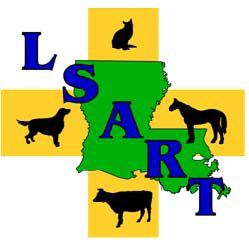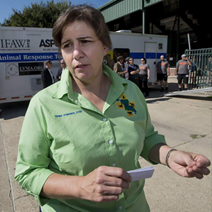
LSART 101: Louisiana’s Pet Plan For Emergencies and Disasters
Course Description:
LSART 101: Louisiana’s Pet Plan For Emergencies and Disasters is first in a three-course learning series.
Animal Responders will be introduced to the Louisiana Pet Plan for Emergencies and Disasters and they should develop an understanding that pet disaster response is part of human emergency response and has designated agencies at the local, state, and federal levels who are responsible for both human and pet disaster response. Learners will be encouraged to develop a personal disaster plan for their families that includes their pets.
Target Audience
Academic Faculty/Staff, Federal Government Employees, State Government Employees, Local Government Employees, Non-Government Employees and Students.
Learning Objectives
- Understand that everyone, including animal responders should plan in advance for emergencies and disasters for themselves, their families, and any animals in their care in their emergency plans
- Understand how all emergency and disaster responses begin at a local level and that the state and federal levels support the response at the local level as needed and requested
- Understand the roles and functions of the Louisiana State Animal Response Team (LSART)
Instructors:

Renee Poirrier, DVM
Dr. Renee Poirrier is the owner of Acadiana Veterinary Clinic, a small and exotic animal private veterinary practice in Lafayette, La. She received her DVM degree from LSU School of Veterinary Medicine in 1988. She was certified in veterinary acupuncture in 1992 by the International Veterinary Acupuncture Society.
She is currently the volunteer director of the Louisiana State Animal Response Team, as well as the statewide unit leader for the Veterinary Medical Reserve Corps. Dr. Poirrier is the Co-Chair of The NASAAEP Evacuation and Transportation Best Practices working group and serves as the Chair of the Louisiana Veterinary Medical Association’s Emergency Management and Disaster Preparedness committee.
As LSART director, Dr. Poirrier has responded to several hurricanes including Hurricanes Katrina and Rita and most recently Hurricane Laura and Ida as well as train derailments and several floods. She assisted state and local officials with developing the current protocols for evacuation and sheltering of pets. She responded to the 2010 Haiti earthquake as an IFAW response partner and oversaw the integration of 214 local Louisiana animal responders over a 5-month period into the 2010 BP oil spill wildlife response.

Suzanne Brevelle
Suzanne Brevelle began her disaster response career as the administrative assistant and grant writer with the Louisiana State Animal Response Team (LSART), in 2016. She continues to work in support of animal emergency response locally, statewide, and nationally as the LSART Administrative Specialist, whose duties include as a technical subject matter expert, providing animal emergency response training for government and non-governmental responder groups and agencies, maintaining the training calendar, volunteer database, finance tracking for response, training, and equipment maintenance support. Suzanne has provided dedicated and experienced support in response to animal emergencies from 2016 to date.
Available Credit
- 1.00 Participation/CETulane Professional and Continuing Education (PaCE) awards 1.00 hour(s) of credit for completing LSART 101: Louisiana’s Pet Plan For Emergencies and Disasters
Price
Required Hardware/software
System Settings
This course is designed to work most effectively if your computer and internet connection meet certain minimal requirements. This course can be accessed using a Windows 10 PC or a Mac with High Sierra1, Mojave, or Catalina. Pop-up blockers should be disabled when viewing the course. Internet Explorer 11 (for Windows 10), or the current version of Google Chrome, Mozilla Firefox, or Apple Safari (for Windows 10 and or Mac) is required. Many of our courses require Java and JavaScript enabled.
Links to External Websites
Links to websites outside this course will open in a new window or tab. Some browsers may minimize the course window. If this occurs, maximize the course window to return to the course.
Adobe Acrobat Reader (for desktops and laptops)
Adobe Acrobat Reader is required to access some documents in this course. If you need to download a free copy of Acrobat Reader, click here.
Internet Connection Speed
A minimum download speed of 1.5 Mbps is recommended for an optimal experience, which is commonly the speed associated with a basic DSL or a cellular/satellite connection. A faster connection, such as cable or fiber service, with further enhance your online experience. A Wi-Fi connection is generally acceptable, but it is dependent upon one of the two services mentioned above. You can check your internet connection speed at http://www.speedtest.net/.

 Facebook
Facebook X
X LinkedIn
LinkedIn Forward
Forward